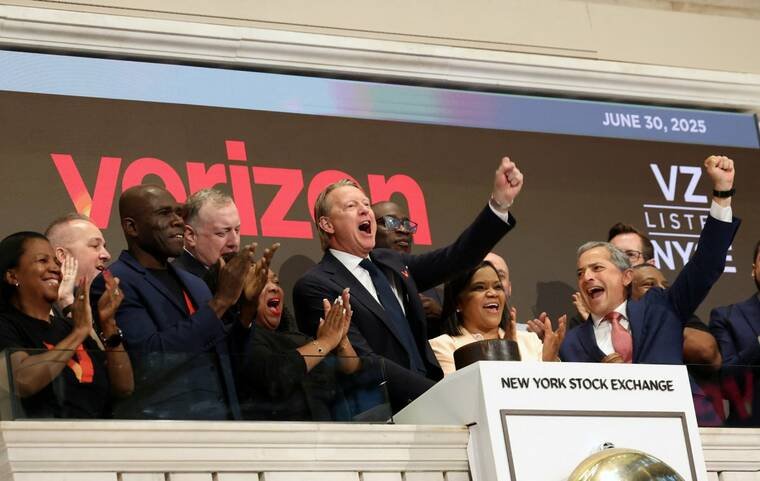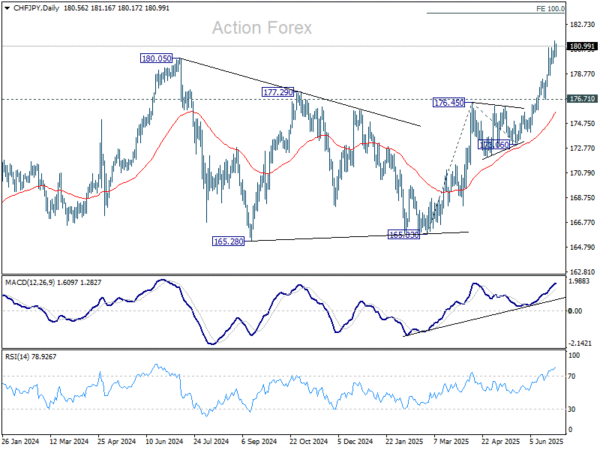Global stocks were higher on Monday on hopes U.S. trade negotiations with key partners would continue to progress, while the dollar slipped and was on track for its worst first half performance in over 50 years.
Canada halted its digital services tax targeting U.S. technology firms just hours before it was due to take effect, in a effort to advance stalled trade negotiations with Washington.
Canadian Prime Minister Mark Carney and U.S. President Donald Trump will resume trade negotiations in an attempt to agree on a deal by July 21, in an extension from Trump’s original July 9 deadline for “reciprocal” tariffs.
The July 9 deadline still holds for other countries, although officials have suggested most deals could now be done by the September 1 Labor Day holiday.
On Monday, U.S. Treasury Secretary Scott Bessent said countries “should be aware” that the U.S. could move back to the tariff levels on April 2, when Trump announced a wide array of steep duties against countries around the globe, and that the decision for any extension to negotiations would be up to Trump.
“We’ve got this deadline coming, but then Trump has said that the deadline can be moved. And then you’ve got markets thinking that the Fed could potentially cut interest rates sooner than later. So there are a lot of drivers here,” said Dennis Dick, a trader at Triple D Trading in Ontario, Canada.
“Investors are just confident here in this market right now, because we’ve had some bad news come in, even some bad earnings reports, and they buy the stocks right back. So bulls remain in complete control.”
On Wall Street, U.S. stocks rose modestly after the S&P 500 and Nasdaq closed at record highs on Friday, led by gains in financial names SPF, while utilities
S5UTIL were the worst performing of the 11 major S&P sectors.
The Dow Jones Industrial Average DJI rose 108.95 points, or 0.25%, to 43,928.53, the S&P 500
SPX rose 8.91 points, or 0.14%, to 6,181.98 and the Nasdaq Composite
IXIC rose 30.67 points, or 0.15%, to 20,302.84.
Investors will eye a flurry of labor market data in the holiday-shortened trading week, culminating in Thursday’s government payrolls report. The report is scheduled for release a day early, while the U.S. stock market will have a shortened session on Thursday and be closed on Friday due to the Independence Day holiday on July 4.
Some Fed officials, including Chair Jerome Powell, have said the strength of the labor market gives the central bank the leeway to hold off on cutting interest rates until they can get a better sense of the impact Trump’s tariffs will have on inflation.
Federal Reserve Bank of Atlanta President Raphael Bostic said Monday that the economy has yet to face the full impact of Trump’s trade tariffs.
Investors were also monitoring the progress of a huge U.S. tax-cutting and spending bill slowly making its way through the Senate, which Republicans will try to pass on Monday.
The Congressional Budget Office estimated the bill would add $3.3 trillion to the nation’s debt over a decade, testing foreign appetite for U.S. Treasuries.
MSCI’s gauge of stocks across the globe EURONEXT:IACWI rose 0.98 points, or 0.10%, to 915.73 and was on track for its third straight session of gains after hitting an intraday record of 916.44.
The pan-European STOXX 600 SXXP index fell 0.29%, but was poised for its second straight quarterly advance despite dropping more than 1% in June.
The dollar index DXY, which measures the greenback against a basket of currencies, fell 0.14% to 97.06, with the euro
EURUSD up 0.24% at $1.1747.
The greenback has struggled throughout the year, partly due to growing expectations the Fed may become more aggressive in cutting interest rates next year when Powell is replaced as Chair. The dollar is down 10.5% for the first half, which would mark its biggest drop over the first six months of the year since 1973, when the U.S. shifted to a free-floating exchange rate.
The yield on benchmark U.S. 10-year notes US10Y fell 0.8 basis points to 4.275%.
U.S. crude CL1! fell 0.96% to $64.89 a barrel and Brent
BRN1! fell to $67.55 per barrel, down 0.32% on the day.
To read Reuters Markets and Finance news, click on https://www.reuters.com/finance/markets For the state of play of Asian stock markets please click on: (0#.INDEXA)






